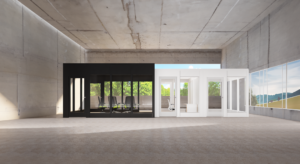27 Jun Building Efficiency: Unlocking Success with Permanent Modular Office Spaces
The evolving nature of business demands flexible and efficient office spaces. Traditional construction methods often struggle to meet the needs of modern enterprises. However, a groundbreaking solution has emerged in the form of permanent modular office buildings. These innovative structures offer a wide range of benefits, from cost-effectiveness to sustainability and scalability. In this blog post, we will explore the concept of permanent modular office buildings, delve into their advantages, and discuss how they are poised to shape the future of the workplace.
Understanding Permanent Modular Office Buildings:
Permanent modular office buildings, also known as modular offices or prefabricated offices, are structures constructed using modular building techniques. Unlike conventional construction, which involves building on-site from scratch, modular offices are built off-site in a factory setting. Modules, or pre-engineered components, are manufactured and assembled in controlled environments and then transported to the site for final installation. This method offers a host of advantages over traditional construction approaches.
Benefits of Permanent Modular Office Buildings:
- Speed and Efficiency: Modular office buildings are constructed with remarkable speed and efficiency due to their off-site assembly process. By manufacturing multiple modules simultaneously, construction timelines can be significantly reduced. Moreover, while modules are being built in the factory, site preparation can take place simultaneously, further expediting the overall construction process. This speed is particularly advantageous for businesses in need of quick deployment or those operating within tight deadlines.
- Cost-effectiveness: One of the most appealing aspects of permanent modular office buildings is their cost-effectiveness. Factory-controlled production eliminates many of the inefficiencies associated with traditional construction, such as weather delays and material waste. The ability to streamline production and reduce on-site labor requirements significantly reduces overall costs. Additionally, modular buildings often require less maintenance and offer energy-efficient solutions, resulting in long-term cost savings for businesses.
- Flexibility and Scalability: Modular offices are inherently flexible and scalable. They can be customized to meet the specific needs of businesses, whether it’s open-concept office spaces, meeting rooms, or specialized areas for specific departments. Furthermore, as businesses grow or requirements change, additional modules can be seamlessly added or existing ones can be reconfigured. This adaptability allows companies to expand their workspace efficiently without disrupting their ongoing operations.
- Sustainability: In an era of increasing environmental consciousness, sustainable building practices are gaining prominence. Permanent modular office buildings offer a sustainable alternative to traditional construction methods. The off-site manufacturing process minimizes waste and optimizes material usage. Additionally, modular structures often incorporate eco-friendly features such as energy-efficient insulation, green roofs, and renewable energy systems. These buildings can help companies reduce their carbon footprint and contribute to a more sustainable future.
Applications and Examples:
Permanent modular office buildings find applications across various industries. They are well-suited for temporary office spaces, construction site offices, remote worksites, educational institutions, healthcare facilities, and more. Many companies, both large and small, have embraced modular construction for their office spaces. For instance, Google utilized modular construction for their London office, while Marriott Hotels implemented modular construction for several of their properties. These examples showcase the versatility and viability of modular office buildings across different sectors.
Overcoming Challenges and Embracing the Future:
While permanent modular office buildings offer numerous advantages, they are not without challenges. Some concerns include potential transportation limitations, coordination between multiple modules, and maintaining design integrity. However, advancements in technology and construction practices continue to address these challenges, making modular construction an increasingly viable option for businesses. Choosing a panelized system, that can be shipped broke down, assembled on site quickly with very little downtime on site
Conclusion:
As businesses strive for agility, sustainability, and efficiency, permanent modular office buildings present a compelling solution. With their ability to provide rapid construction, cost-effectiveness, adaptability, and a clear path success.
The evolving nature of business demands flexible and efficient office spaces. Traditional construction methods often struggle to meet the needs of modern enterprises. However, a groundbreaking solution has emerged in the form of permanent modular office buildings. These innovative structures offer a wide range of benefits, from cost-effectiveness to sustainability and scalability. In this blog post, we will explore the concept of permanent modular office buildings, delve into their advantages, and discuss how they are poised to shape the future of the workplace.
Understanding Permanent Modular Office Buildings:
Permanent modular office buildings, also known as modular offices or prefabricated offices, are structures constructed using modular building techniques. Unlike conventional construction, which involves building on-site from scratch, modular offices are built off-site in a factory setting. Modules, or pre-engineered components, are manufactured and assembled in controlled environments and then transported to the site for final installation. This method offers a host of advantages over traditional construction approaches.
Benefits of Permanent Modular Office Buildings:
- Speed and Efficiency: Modular office buildings are constructed with remarkable speed and efficiency due to their off-site assembly process. By manufacturing multiple modules simultaneously, construction timelines can be significantly reduced. Moreover, while modules are being built in the factory, site preparation can take place simultaneously, further expediting the overall construction process. This speed is particularly advantageous for businesses in need of quick deployment or those operating within tight deadlines.
- Cost-effectiveness: One of the most appealing aspects of permanent modular office buildings is their cost-effectiveness. Factory-controlled production eliminates many of the inefficiencies associated with traditional construction, such as weather delays and material waste. The ability to streamline production and reduce on-site labor requirements significantly reduces overall costs. Additionally, modular buildings often require less maintenance and offer energy-efficient solutions, resulting in long-term cost savings for businesses.
- Flexibility and Scalability: Modular offices are inherently flexible and scalable. They can be customized to meet the specific needs of businesses, whether it’s open-concept office spaces, meeting rooms, or specialized areas for specific departments. Furthermore, as businesses grow or requirements change, additional modules can be seamlessly added or existing ones can be reconfigured. This adaptability allows companies to expand their workspace efficiently without disrupting their ongoing operations.
- Sustainability: In an era of increasing environmental consciousness, sustainable building practices are gaining prominence. Permanent modular office buildings offer a sustainable alternative to traditional construction methods. The off-site manufacturing process minimizes waste and optimizes material usage. Additionally, modular structures often incorporate eco-friendly features such as energy-efficient insulation, green roofs, and renewable energy systems. These buildings can help companies reduce their carbon footprint and contribute to a more sustainable future.
Applications and Examples:
Permanent modular office buildings find applications across various industries. They are well-suited for temporary office spaces, construction site offices, remote worksites, educational institutions, healthcare facilities, and more. Many companies, both large and small, have embraced modular construction for their office spaces. For instance, Google utilized modular construction for their London office, while Marriott Hotels implemented modular construction for several of their properties. These examples showcase the versatility and viability of modular office buildings across different sectors.
Overcoming Challenges and Embracing the Future:
While permanent modular office buildings offer numerous advantages, they are not without challenges. Some concerns include potential transportation limitations, coordination between multiple modules, and maintaining design integrity. However, advancements in technology and construction practices continue to address these challenges, making modular construction an increasingly viable option for businesses. Choosing a panelized system, that can be shipped broke down, assembled on site quickly with very little downtime on site
As businesses strive for agility, sustainability, and efficiency, permanent modular office buildings present a compelling solution. With their ability to provide rapid construction, cost-effectiveness, adaptability, and a clear path success.


